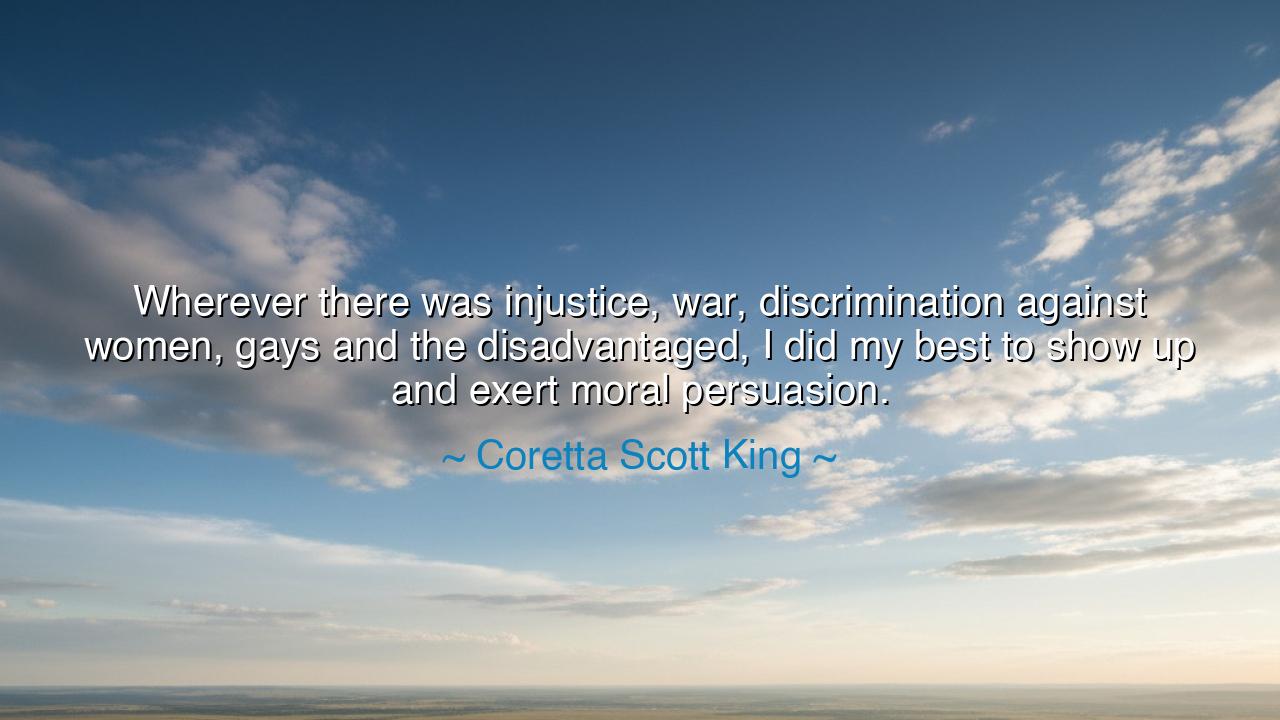
Wherever there was injustice, war, discrimination against women
Wherever there was injustice, war, discrimination against women, gays and the disadvantaged, I did my best to show up and exert moral persuasion.






O children of the future, listen closely to the words of Coretta Scott King, a woman whose life was dedicated not only to the memory of her husband, Dr. Martin Luther King Jr., but to the fight for justice and human dignity in all its forms. She said, "Wherever there was injustice, war, discrimination against women, gays and the disadvantaged, I did my best to show up and exert moral persuasion." These words resonate across time, for they carry the message of an unwavering commitment to righting the wrongs of the world, to standing up against injustice, and to lifting the voices of the oppressed.
Coretta’s words are not merely a declaration of her actions but a call to all of us to examine our own lives in the face of injustice. To show up, she tells us, is not simply a matter of being physically present, but of bringing with us the light of moral persuasion—the power of conviction, the force of righteousness, and the strength of love. Whether the battle is for civil rights, for the empowerment of women, for the LGBTQ+ community, or for the disadvantaged, the true measure of one's character is not in the ease with which we stand on the sidelines, but in the courage it takes to rise up and speak truth to power.
Let us reflect, O children, on the story of Socrates, the great philosopher of ancient Greece, who stood in the face of powerful forces and spoke for justice and truth, even when it led to his execution. Socrates, though not a warrior of the sword, was a warrior of the spirit. He confronted injustice in the streets of Athens, questioning the very foundation of society, not with weapons, but with questions and dialogue. Though the rulers of Athens feared his words, Socrates understood that the power of moral persuasion was more enduring than any sword. In this way, Socrates teaches us that even in the face of oppression, the pursuit of justice through moral action is the highest calling.
Similarly, Coretta Scott King, through her dedication to the Civil Rights Movement, mirrored the courage of Socrates. She did not simply watch from the sidelines as injustice reigned; she showed up—with her words, with her presence, and with her actions. Her involvement in marches, her advocacy for women’s rights, and her steadfast support for equality for all people stand as a testament to the power of standing firm in the face of discrimination. Whether she was marching for the rights of African Americans, speaking out against violence in war, or championing the rights of women and LGBTQ+ individuals, she knew that her voice could make a difference.
Take, for example, the Montgomery Bus Boycott of 1955, a pivotal moment in the Civil Rights Movement. Though it was Rosa Parks who famously refused to give up her seat, it was Coretta Scott King and countless others who showed up to support the cause, who exerted moral persuasion by standing together in solidarity. They didn’t just protest the segregation on buses; they challenged the very system of oppression that pervaded the United States. Through their unwavering courage, they demonstrated that moral persuasion is not passive—it is an active force that transforms.
But, O children, the challenge is not only to show up in moments of crisis, but to remain present in the quiet struggles that happen every day. Injustice is not only found in the headlines of history books; it lives in the small moments, in the quiet discrimination that often goes unnoticed. Coretta’s example teaches us that moral persuasion is not just a tool for times of visible conflict, but a constant practice—a way of being in the world. Whether it is in the workplace, in our schools, or in our communities, we must always strive to be the voice of justice, the light in times of darkness, and the advocate for those who are too often silenced.
Thus, I leave you with this lesson: show up when injustice calls. Stand not as a passive observer, but as an active participant in the fight for truth and equality. The legacy of Coretta Scott King reminds us that each of us holds the power to transform the world around us. Do not shy away from difficult conversations or uncomfortable truths. Whether it is standing up for the rights of women, LGBTQ+ individuals, or any marginalized group, remember that moral persuasion can change hearts, minds, and entire societies. Be present in your own life and the lives of others, for it is through action and compassion that we can move ever closer to a world that embodies the values of justice, love, and equality for all.






AAdministratorAdministrator
Welcome, honored guests. Please leave a comment, we will respond soon